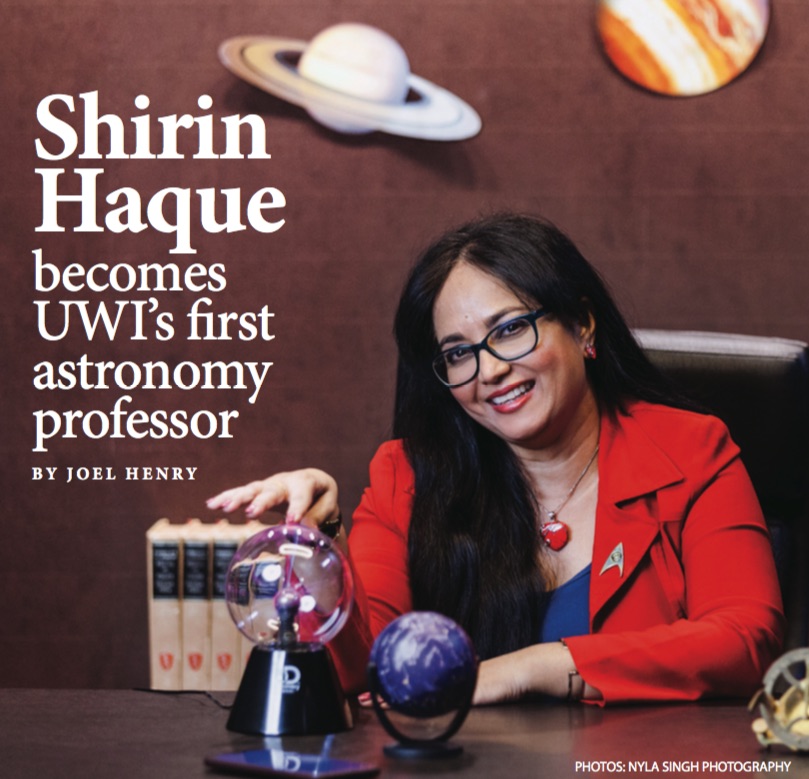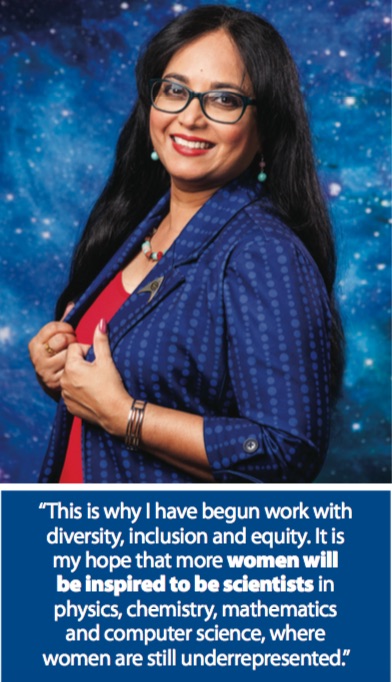
Professor Shirin Haque has made history as the first in her field to rise to The UWI highest academic rank. Haque is the first professor in the field of Astronomy at the Caribbean university.
The outstanding scholar is one of The UWI’s five newest academics promoted to the rank of Professor with effect from May 2022. When asked how she felt about the appointment, Prof Haque said, “Extremely humbled and mind blowing.”
She added, “Frankly, I lacked the confidence that I could make it and kept postponing my application despite the urging from several academic well-wishers and mentors. It surprised and humbled me when the common refrain in the deluge of congratulatory messages that poured in was ‘long overdue!’”
Yet, as a pioneer in her field, she dealt with naysayers early in her career:
“I recall my first supervisor for the MPhil, clearly telling me, ‘You know you won't get a job with this?’ and I immediately thought of Plan B – I shall be a physics teacher in school. But I had to give my passion for astronomy a shot. From there on, it feels like serendipity played an amazing role in bringing me to this point.”
The new professor spoke highly of The UWI, saying the university has been “amazing in nurturing and supporting me.” Her hope, she said, was to “give back to the region a fraction of what they have done for me”.
Congratulating the new professor, Vice-Chancellor of The UWI Professor Sir Hilary Beckles praised her for illuminating both The UWI and the Caribbean on the world stage.
“This brilliant star has been an exemplar for women in science and aspiring astronomers for decades and is truly deserving of this historic promotion.”
“The university community, '' he added, “is especially proud that she has received her tutoring and dedicated her academic service here at The UWI. She embodies excellence and the university’s mission to advance learning, create knowledge and foster innovation for the positive transformation of the Caribbean and the world.”
Before her professorial appointment, she served as a senior lecturer in the Department of Physics at St Augustine. She was the only student pursuing and graduating from the Department of Physics at St Augustine in Astronomy for decades until the seven postgraduate students she supervised.
“I have given numerous talks in schools and I see so many children who remind me of myself at their age,” Prof Haque said of her quest as educator and advocate for her field. This work can now be enhanced by her appointment.
“Their eyes are wild with passion for astronomy, but there are demotivating voices cries all around them. It's been said that if you can see it, you can be it. Becoming a professor is an honour that gives you a voice and legitimacy,” she said.
The timing of her appointment is also excellent because the field of astronomy is in a period of major evolution – and with it, new career opportunities.
“The amount of data expected in the coming decade from the next generation of VLA (Very Large Arrays) in radio astronomy is going to create a severe workforce shortage,” said Prof Haque.
Already, the National Science Foundation (an independent agency of the US government that supports research and education in science and engineering) has reached out to her to “train, recruit and create opportunities for the best and brightest of our students”.
The UWI is the only non-US partner in a group of about a dozen universities in the Radio Astronomy Data Imaging Analysis Lab (RADIAL) programme.
No discipline, she said, has as much transferable skills needed in the coming decades as astronomy. They are highly sought after for their programming skills, mathematics, data analysis and critical thinking.
“So I am going back to the schools and hope to introduce astronomy as the 34th subject in CXC CSEC, and then onto CAPE,” she said.
Professor Haque’s main research interests include astrobiology, observational astronomy, cosmology, and solar astronomy. She has also published in cross-disciplinary fields in psychology, cultural studies in science, women in science, and science education.
When asked what she felt the impact of her success could be for women and girls with an interest in the sciences, she recalled a conversation with her mother:
“When the announcement of my professorship came, my mother, who grew up in a village in India, innocently remarked ‘I thought only men can be professors!’ While it is an amusing remark, it's also laden with stereotypes that mould our thinking and therefore what we believe we can achieve.”

Afterwards, however, her mother insisted on calling her “professor” with pride.
“This is why I have begun work with diversity, inclusion and equity. It is my hope that more women will be inspired to be scientists in physics, chemistry, mathematics and computer science, where women are still underrepresented.”
Prof Haque has published many scholarly works of note, including in the prestigious journal Science in Astrobiology. She has also produced 18 science magazine issues, four documentaries, two series for television, and numerous online media and popular science articles.
She has also won many awards – the Anthony N Sabga Caribbean Awards for Excellence for Science and Technology, the CARICOM Science Award (the first woman awardee) and the Outstanding Woman Award UWI 70th Anniversary, among many others.
So what next for this pioneering scientist and new professor?
“I smile at that question because it's what I ask myself all the time!” she replied.
“Looking back, my original plan was to be a theoretical astronomer, where I could work at home and be a mom to my two daughters as a single parent. John Lennon said life is what happens when you're busy making other plans. My best laid plans became moot as we launched into observational astronomy, then into astrobiology and now radio astronomy,” she explained.
That diversity, however, was good for her because “that’s where the most interesting developments were happening”.
“The joy and mystery of discovery in astronomy has always been my driving force. That's why my title is Professor of Astronomy, simply. It encompasses all we do.,” she said. “So, what's next? We have to pay attention to the next big question in astronomy and see if and how the Caribbean can contribute.
“Will it be finding life conclusively? Or multiverses? Or archaeoastronomy? You can be sure, we will be on that bandwagon, joining hands with the international community of astronomers with our Caribbean voice.”